Wednesday, May 15, 2024. Annette’s News Roundup.
I think the Roundup makes people feel not so alone.
To read an article excerpted in this Roundup, click on its blue title. Each “blue” article is hyperlinked so you can read the whole article.
Please feel free to share.
Invite at least one other person to subscribe today! Here 👇 is the link to share for others to subscribe. https://buttondown.email/AnnettesNewsRoundup
Remember: when you share the Roundup, you are fighting Fascism and helping to bring about a Democratic victory in 2024.
_________________________________________________
Joe is always busy.
George Clooney, Julia Roberts and Barack Obama Will Headline Fundraiser for Biden https://t.co/XIE1IX89zE
— Adam Parkhomenko (@AdamParkhomenko) May 13, 2024
New York Times - Biden Administration Advances $1 Billion Arms Sale to Israel.
The notification of the deal to Congress as the president holds up the delivery of other weapons shows the fine line the administration is trying to walk with its longtime ally.
_________________________________________________
Kamala is always busy.
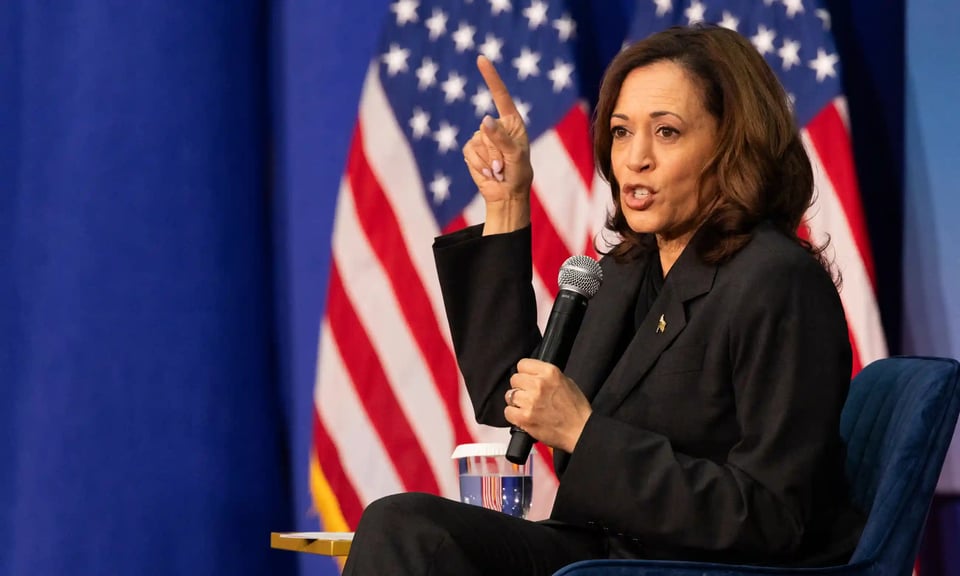
“We have to know that sometimes people will open the door for you and leave it open. Sometimes they won't, and then you need to kick that f--king door down.”
— Vice President Kamala Harris in a message to young people during the Asian Pacific American Institute for Congressional Studies Summit on Monday.
That is so interesting because here is the Vice President on live television talking about how the Biden admin forgave billions in loan debt, granted small biz loan access to the previously incarcerated, and is on track to have medical debt NOT count against credit scores. https://t.co/iJ8hAMAW6H pic.twitter.com/kKD1qkPKwZ
— Renee (@PettyLupone) May 14, 2024
_________________________________________________
Jamie Raskin is busy too.
Ranking Member Raskin Probes Donald Trump’s Offer to Change U.S. Energy Policy in Exchange for $1 Billion in Campaign Cash from Big Oil
May 14, 2024 Press Release
Letters Follow Damning Report that Trump Offered Quid Pro Quo Arrangement to Top Oil CEOs.
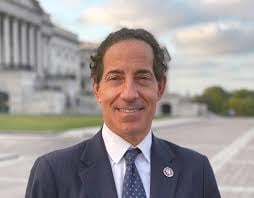
Washington, D.C. (May 14, 2024)—Rep. Jamie Raskin, Ranking Member of the Committee on Oversight and Accountability, is demanding answers from nine Big Oil CEOs following reports of quid pro quo propositions made by former President Donald Trump to dismantle fossil fuel regulations in exchange for $1 billion in contributions to his presidential campaign.
“I write to request any information you may have about quid pro quo financial agreements related to U.S. energy policy that were reportedly proposed at a recent campaign fundraising dinner with ex-President Donald Trump at his Mar-a-Lago Club that you appear to have attended. Media reports raise significant potential ethical, campaign finance, and legal issues that would flow from the effective sale of American energy and regulatory policy to commercial interests in return for large campaign contributions,” wrote Ranking Member Raskin in the letters.
On May 9, 2024, the Washington Post reported that former President Donald Trump held a 20-person “Energy Round Table” with top oil and gas executives at his Mar-a-Lago Club on April 11, 2024. According to the reporting, the former President sought $1 billion in campaign contributions from the industry executives in exchange for an explicit promise that, if elected, his Administration would roll-back environmental regulations. Former President Trump reportedly pledged to take specific official actions to end the freeze on permits for new liquefied natural gas exports, start auctioning off more leases for oil drilling in the Gulf of Mexico, and rescind rules that reduce emissions from cars.
According to the Washington Post, former President Trump told industry executives, “You all are wealthy enough” and that “you should raise $1 billion to return me to the White House.” He also claimed that “[g]iving $1 billion would be a ‘deal’” because of the taxation and regulation he would help them avoid.
These reports of a solicitation of payments in exchange for an explicit promise of specific future official actions are both highly credible and consistent with past behavior.
Indeed, in January 2024, Oversight Committee Democrats released a staff report uncovering how former President Donald Trump received at least $7.8 million from foreign states and their leaders in blatant violation of the Constitution’s Foreign Emoluments Clause, and rendered a sequence of foreign policy favors to his patrons.
This new reporting raises significant concerns that the former president is prospectively trying to sell out U.S. policy to fossil fuel companies and that, if re-elected, he will scrap environmental regulations for the right price and continue to work with Big Oil to undermine effective climate policy.
“Mr. Trump’s unvarnished quid pro quo offer is especially troubling evidence in light of recent accounts that the ‘U.S. oil industry is drawing up ready-to-sign executive orders for Donald Trump aimed at pushing natural gas exports, cutting drilling costs and increasing offshore oil leases in case he wins a second term.’ These preparatory actions suggest that certain oil and gas companies, which have a track record of using deceitful tactics to undermine effective climate policy may have already accepted or facilitated Mr. Trump’s explicit corrupt bargain,” Ranking Member Raskin added.
Click here to read the letter to Chevron.
Click here to read the letter to ExxonMobil.
Click here to read the letter to Continental Resources.
Click here to read the letter to Chesapeake Energy.
Click here to read the letter to Occidental Petroleum.
Click here to read the letter to Venture Global LNG.
Click here to read the letter to Cheniere Energy.
Click here to read the letter to EQT Corporation.
Click here to read the letter to American Petroleum Institute.
_________________________________________________
Vocal and active opposition to Trump grows.
Watch George Stephanopoulos 👇.
Stephanopoulos: We have never had a former president who was impeached then indicted for trying to overturn an election. We've never had a former president who lies about the election that he lost. We've never had a former president or presidential candidate who refuses to pledge… pic.twitter.com/gwIOBfI9ob
— Biden-Harris HQ (@BidenHQ) May 14, 2024
Another cartoonist in the court room when Michael Cohen finished - the great Liza Donnelly.
When asked by the prosecution, “Do you have any regrets?” Michael Cohen said at the end of his testimony,with the prosecution. #trumptrial #trump #nyc #michaelcohen pic.twitter.com/ZBICdC2PyC
— Liza Donnelly (@lizadonnelly) May 14, 2024
There are exceptions.
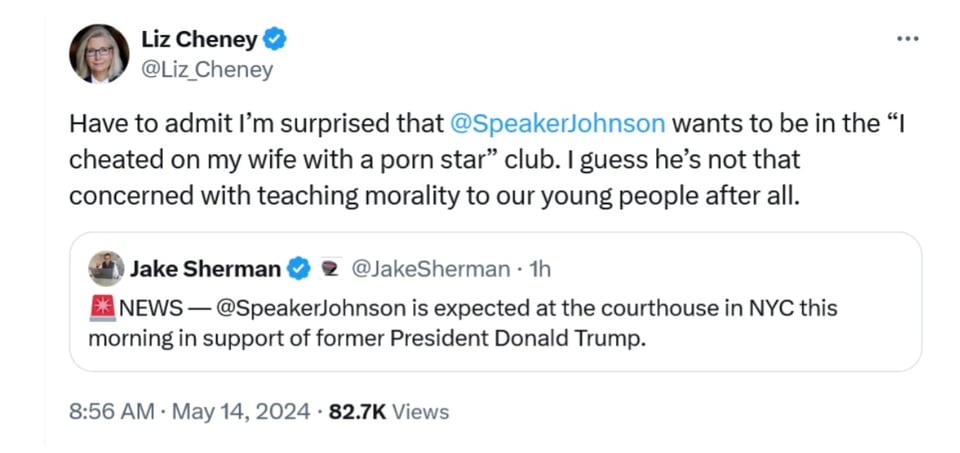
People are losing respect for our system of justice because a Speaker of the House stands outside a courthouse to falsely denigrate it.
— Adam Schiff (@RepAdamSchiff) May 14, 2024
If you have no respect for the rule of law, Mr. Speaker,
At least have some self-respect. https://t.co/GOqjZ8Bj8w
Senator J.D. Vance was another visitor to Trump in court. It’s worth remembering what he said about Trump in the past.
Here's a gift link to J.D. Vance's 2016 article in the Atlantic in which he warned: “Trump is cultural heroin. ... His promises are the needle in America’s collective vein."
— Mark Jacob (@MarkJacob16) May 14, 2024
Now Vance is a drug pusher, profiting off of the addicts.https://t.co/tmJsARFRTY
Tommy Tuberville of Alabama was another of the recent Trump syncophants.(On Tuesday, those included North Dakota’s governor, Doug Burgum, and the former presidential candidate Vivek Ramaswamy.)
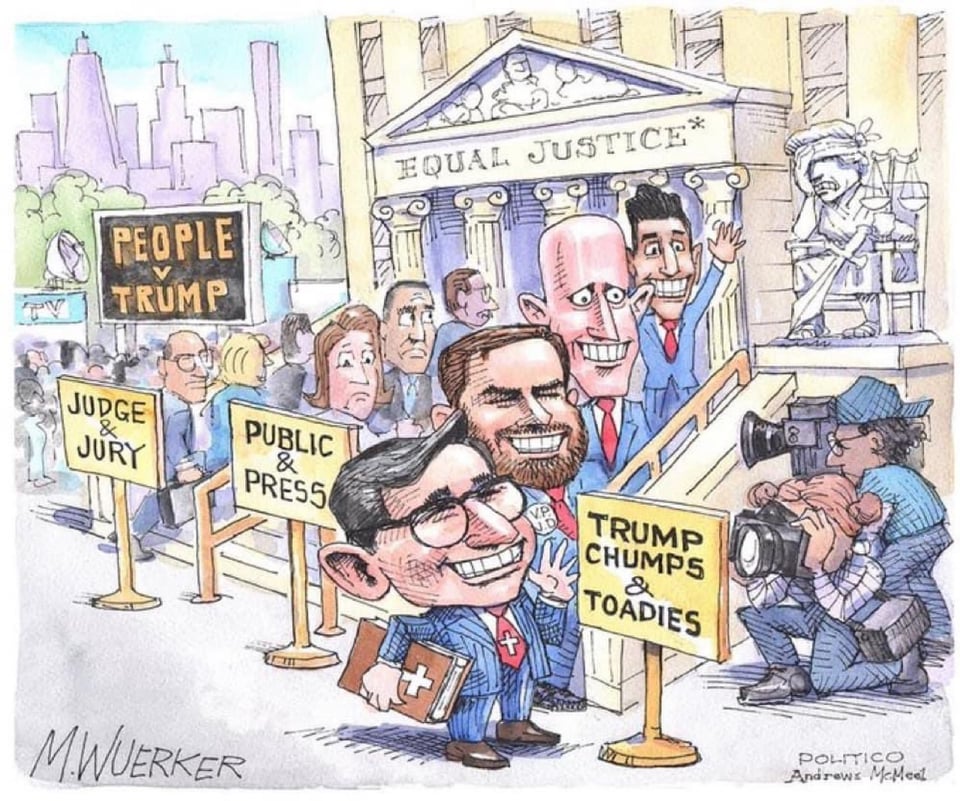
_________________________________________________
Some results from Tuesday’s Primaries.
Maryland.
Decision Desk HQ projects Angela Alsobrooks wins the Democratic primary for US Senate in Maryland.#DecisionMade: 9:39pm ET pic.twitter.com/VfFjFGGu3q
— Decision Desk HQ (@DecisionDeskHQ) May 15, 2024
Representative David Trone, a co-owner of the giant alcohol retailer Total Wine and More, gave up his safe House seat, spent more than $60 million of his fortune and lost the Senate Democratic primary to Angela Alsobrooks, who hopes to become only the third Black woman to be elected to Congress’s upper chamber. Mr. Trone outspent Ms. Alsobrooks by a nearly 10-to-1 ratio.
If Ms. Alsobrooks and Representative Lisa Blunt Rochester, Democrat of Delaware, both win their Senate contests in November, voters will have doubled the number of Black women elected to the Senate in American history, and for the first time ever, two Black women will serve in the Senate at once.
(NY Times).
I just got off the phone with Senator Elfreth, congratulating her on her hard-fought victory. I look forward to ensuring that we send Senator Elfreth to Congress this November.
— Harry Dunn (@libradunn) May 15, 2024
Although tonight’s results may not have gone like we hoped, all I can feel right now is gratitude.…
In the most online, partisan Democratic circles, Harry Dunn was a star, a burly Capitol Police officer who battled a pro-Trump mob on Jan. 6, 2021, testified before the House committee that investigated the attack on the Capitol and then ran for the House he had defended at risk to his life.
He may have lived slightly outside the House district he wanted to represent. He may have had no political experience. But he was the candidate running to “save democracy.”
On Tuesday, he was beaten by a soft-spoken workhorse, State Senator Sarah Elfreth, in a Democratic primary almost certain to determine who will represent Maryland’s Third House District next year.
Mr. Dunn had raised nearly $4.6 million from across the country by the end of April and dominated the airwaves. Ms. Elfreth raised $1.5 million and had the backing of the United Democracy Project, a pro-Israel political action committee affiliated with the American Israel Political Affairs Committee.
But she had something Mr. Dunn didn’t have: legislative experience and a record in the Democratic political trenches.(NY Times).
Nebraska. West Virginia.
In both Nebraska and West Virginia, the mainstream of the G.O.P. prevailed.
In Nebraska’s swing district around Omaha, Representative Don Bacon, who has a reputation as an independent voice, faced off against Dan Frei, a conservative challenger backed by the state’s Republican Party, a pro-Trump bastion. Mr. Bacon held that a Frei victory in the primary would hand his seat to the Democrats in November. On Tuesday, Mr. Bacon trounced Mr. Frei, setting up a much tougher race for the Democratic nominee, State Senator Tony Vargas.
In West Virginia, Derrick Evans, an unrepentant rioter arrested after participating in the Jan. 6, 2021, attack on the Capitol, challenged Representative Carol Miller in a safe Republican seat. Ms. Miller is no moderate, but she isn’t a rioter. The incumbent whipped the insurgent. (NY times).
_________________________________________________
Friday we celebrate 20 years of Marriage Equality.

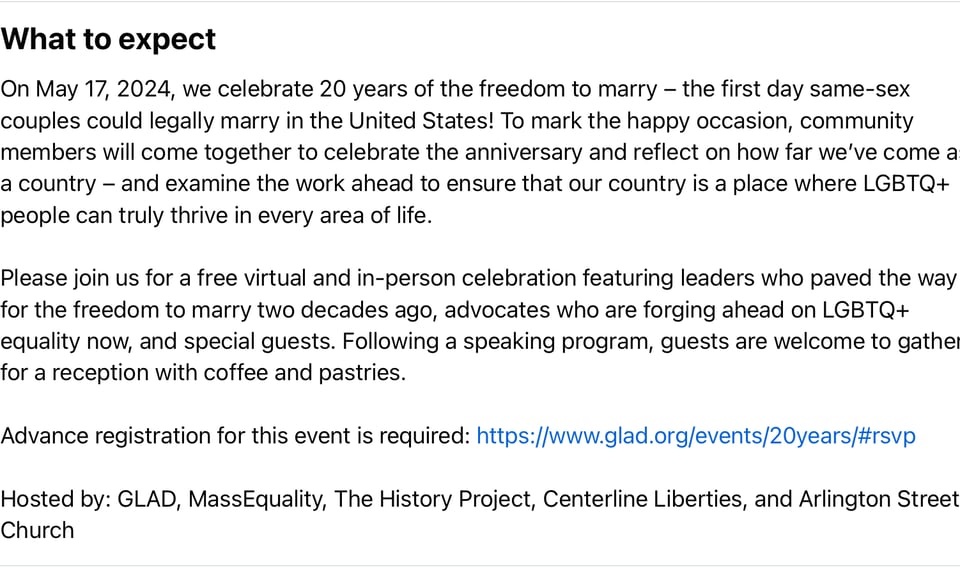
How 20 Years of Same-Sex Marriage Changed America
After ’dire predictions,’ the effects have been largely positive, a new study finds.
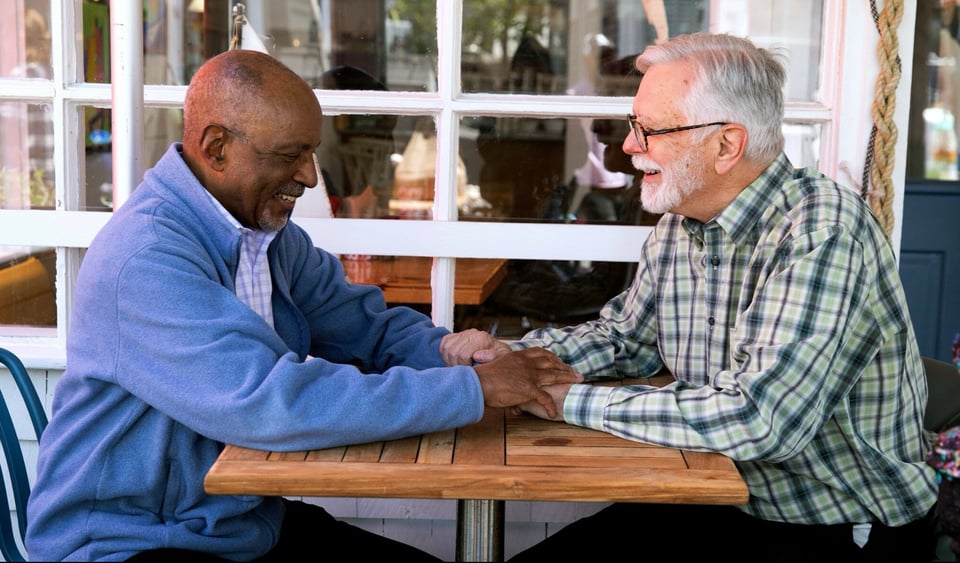
David Wilson and Rob Compton, in glasses, in Provincetown, Mass. The couple wed 20 years ago in one of America’s first state-sanctioned marriages.
Twenty years ago this week, David Wilson and Rob Compton entered into a marriage that some believed would bring on the apocalypse. These days, they are happily retired and spend their time volunteering and visiting with their grandchildren.
When America’s first state-sanctioned same-sex marriages took place in Massachusetts on May 17, 2004, Wilson and Compton’s among them, a furious political controversy swirled. “The House and Senate, the governor, the president, the pope, the Black church I grew up in—everyone was against us, and it was very unnerving,” Wilson, 80, recalled in a recent interview.
Opponents warned that the consequences would be dire. Then-Gov. Mitt Romney compared the court ruling that enabled it to the 1857 Dred Scott case that denied citizenship to Black people. Both presidential candidates, Democrat John Kerry and Republican President George W. Bush, came out against it. Catholic bishops called it “a national tragedy.” Sure to follow, they warned, was the ruination of the institution of marriage, the American family and potentially society itself.
Two decades later, what was once the white-hot center of political debate has receded to the background. Polls show nearly three-quarters of Americans, including 49% of Republicans and a majority of regular churchgoers, support it. The Supreme Court made same-sex marriage a nationwide right in 2015, and Congress gave federal recognition to the practice on a broad bipartisan vote in 2022. One of the votes in favor: Sen. Mitt Romney, who said the Respect for Marriage Act “signals that Congress—and I—esteem and love all of our fellow Americans equally.”
The widespread public approval suggests most people don’t believe the horrors once forecast have resulted from same-sex marriage’s legalization, and now there is evidence to prove it. A comprehensive new research report by the Rand organization finds that the consequences of two decades of legal same-sex marriage have been broadly positive for gay and straight Americans alike.
The researchers, who surveyed the existing literature and conducted their own analysis, could find no negative effects on straight couples’ rates of marriage, divorce or cohabitation as states legalized same-sex marriage. In fact, the effect on different-sex marriages was slightly positive. Meanwhile, same-sex couples saw a range of improved outcomes, such as greater health and financial security. “Overall, the fears of opponents of same-sex marriage simply have not come to pass,” said the study’s co-author, Benjamin R. Karney, a Rand researcher and UCLA psychology professor.
Today, many younger people might not even know their elders once had to fight for same-sex marriage, said Compton, 75, a retired Delta Dental executive. “Everybody takes it for granted,” he said. “It’s almost a nonissue. For kids 20 or younger, they’ve never known anything else.”

Wilson and Compton embraced the Rev. Kim Crawford Harvie after she signed the couple’s marriage certificate after a Boston ceremony on May 17, 2004.
A gradual transformation
The 20-year anniversary has led those involved in the fight for what they came to call “marriage equality” to reflect on a political and personal milestone. Evan Wolfson, founder of the advocacy group Freedom to Marry, believes those first Massachusetts marriages catalyzed a gradual transformation in Americans’ attitudes.
As same-sex married families became part of more communities, what was previously an abstract debate became real and relatable. “Once gay people were in the marriage club, we could talk about our love in the common language so many people use, and momentum accelerated,” he said. “Fair-minded people began to look at this in human terms.”
More than one million same-sex couples have now been married, and the Rand researchers found that they have reaped the benefits of marriage that have long been well-documented for different-sex couples. In states that legalized same-sex marriage, LGBTQ people had higher levels of health-insurance coverage and lower rates of sexually transmitted infections and problematic substance use, according to the report. They also had higher earnings and rates of homeownership.
Jen and Dawn BarbouRoske of Iowa City, Iowa, experienced the drawbacks of not being able to marry. The women met playing softball in the 1990s and considered themselves “married in our hearts” for years before they could legally marry, Jen BarbouRoske said. They combined their last names, exchanged rings and had a ceremony—but when Jen was admitted to the emergency room during a visit to family in Texas, hospital workers wouldn’t let Dawn, the person most familiar with her medical conditions and history, past the front desk to see her.
Three months after the Iowa Supreme Court legalized same-sex marriage in 2009, the couple were legally married over rainbow cupcakes in a public park. Today they proudly display family photos with their daughters and dogs in the public school where they both work, Jen as a nurse, Dawn as a teacher. “We always knew we would be together, but marriage really brought validity to our family,” Dawn said. “Not that you have to be married, but in our society, a family with kids is usually married. That’s how we show commitment and love.”
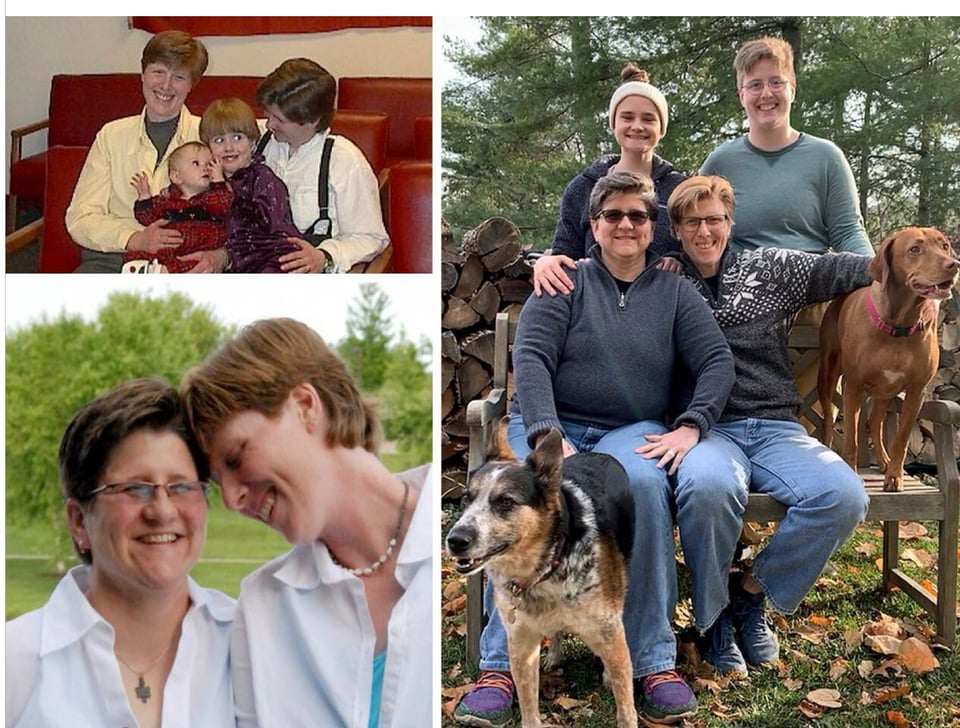
Jen and Dawn BarbouRoske, seated with dark glasses, and their family. They considered themselves married for years before their 2009 wedding, lower left.
The principal argument made by opponents of same-sex marriage wasn’t that it wouldn’t benefit gay people but that it would damage marriage for everyone else—that detaching the institution from the traditional notion of family would cheapen it and make it less appealing to opposite-sex couples. This argument, made in numerous judicial opinions and legal briefs arguing against same-sex marriage, was a key proposition the Rand researchers sought to examine, given that marriage rates have been declining overall for decades.
Because different states legalized marriage at different times—Massachusetts was followed by Connecticut, Iowa, Vermont and New Hampshire; 37 states had legalized same-sex marriage by the time the Supreme Court made it the law of the land with the 2015 Obergefell decision—the researchers could compare marriage rates across states while controlling for other factors. They didn’t find any evidence that straight couples’ rates of cohabitation or divorce increased. Rather, they found that legal same-sex marriage was associated with increases in marriage that couldn’t be explained by same-sex marriages alone. Opposite-sex marriages also increased as a result.
Rand economist Melanie A. Zaber, a co-author of the report, speculated that this effect could have resulted from the increased attention to the benefits of marriage created by the political debate over it. “It turns out if you spend a lot of time discussing and debating the benefits of marriage in the media, that increases the salience among the broader public,” Zaber said.
E ric Alva and Danny Ingram met in 2010, when the two military veterans were both lobbying Congress to repeal “Don’t Ask, Don’t Tell,” the Clinton-era policy that barred openly gay people from serving in the military. “We’re a mixed marriage—he’s a Marine, I’m Army,” Ingram jokes. Getting married allowed them to qualify for a Veterans Affairs loan for their house in San Antonio, where they throw an annual Pride-themed pool party and invite the neighbors to bring their children over.
Putting his ring on in the morning still makes Alva smile, and when he corrects strangers who ask about his wife—“Actually, I have a husband”—they rarely bat an eye. “We fought to defend everyone’s rights, and now we’re honestly living the American dream,” said Alva, who lost his left leg when he stepped on a land mine in Iraq.

Danny Ingram and Eric Alva, in blue tie, were married in 2017, left, after the two veterans met in 2010 while lobbying Congress to repeal ‘Don’t Ask, Don’t Tell.’ They now live in San Antonio with their dog, Sandy.
Brad Wilcox, a sociologist who directs the National Marriage Project at the University of Virginia and wasn’t involved with the Rand report, says he wasn’t surprised that gay couples have benefited from marriage. But he points out that many questions about the long-term effects remain. Only about 1.3% of married couples are same-sex, indicating that LGBTQ people aren’t marrying at a rate commensurate with their share of the population. (About 8% of Americans identify as LGBTQ, according to Gallup.) With marriage rates continuing to decline overall, the institution has only become more politically polarized, and questions remain about the effects on children of being raised in same-sex families. “It’s still too early to tell the effect on the broader culture of marriage,” Wilcox said.
Ralph Reed, the veteran conservative strategist and chairman of the Faith and Freedom Coalition, argues that Republicans should continue to fight for the idea of the traditional family that their evangelical base believes in and against the “judicial overreach” of the Obergefell decision. “I don’t think it turned out to be as epochal as either side hoped or feared, to be honest,” he said of same-sex marriage being legalized. “It was not as big a breakthrough for the gay community as they thought it would be, and on our side, it probably in hindsight didn’t do as much damage as we feared.”
Even as the public debate over same-sex marriage appears mostly settled, LGBTQ advocates face political battles on other fronts, including transgender rights and school curricula.
How the tide turned
It’s difficult to think of a political issue that has seen as dramatic a shift in public opinion as marriage. But that doesn’t mean progress was swift or easy.
When Wolfson wrote a law-school paper on same-sex marriage at Harvard in 1983, the idea struck even many gay activists as ridiculous. Gay relationships were themselves illegal in many places until the Supreme Court struck down sodomy laws in 2003. Against the backdrop of the AIDS crisis, many advocates saw marriage as an impractical distraction or even rejected it as a heteronormative institution.
Wolfson persisted, helping argue a 1993 case before the Hawaii Supreme Court that found the state must grant same-sex marriages—and spurred a swift national backlash. Hawaii voters amended the state constitution to outlaw same-sex marriage, and President Clinton in 1996 signed the Defense of Marriage Act outlawing federal recognition of same-sex marriage. Opposition to same-sex marriage was bipartisan: The act passed the House 342-67 and the Senate 85-14. Just 27% of Americans believed same-sex marriage should be legal at the time, according to Gallup.
In 2004, the same year the first marriages were performed in Massachusetts, 11 states approved ballot initiatives banning same-sex marriage. Many Democrats saw the referendums as a ploy by the Bush campaign to turn out conservative and religious voters and blamed them for Kerry’s defeat in that year’s presidential election. Advocates were further demoralized when, in 2008, California also voted to ban same-sex marriage.
“There was a lot of pressure on us to stop and pivot to civil unions,” recalled Marc Solomon, who worked on the marriage fight in Massachusetts and nationally as Freedom to Marry’s campaign director. “The thing that was so clear to me was that seeing is believing. Our opponents had all these dire predictions, but once people could actually get married, all people saw was just a huge amount of love.”
The tide began to turn in 2012. That year, President Obama—following the lead of then-Vice President Joe Biden—announced he had “evolved” from his previous opposition, and four states—Maine, Maryland, Minnesota and Washington—took the side of same-sex marriage in ballot referendums for the first time. The victories were partly because of a crucial change in messaging. While earlier same-sex marriage campaigns had emphasized a dry, legalistic argument about the civil rights and benefits that marriage confers, in 2012 activists pivoted to accentuating love, commitment and universal family values. This change appealed to people’s emotions and helped campaigners reach religious people and conservatives.
“As a lifelong Republican, I’ve always seen this as fundamentally an issue about freedom and individual liberty as well as about strengthening the institution of marriage,” said James Dozier, chairman of Centerline Liberties, a right-leaning consulting firm that commissioned and funded the Rand report. Echoes of the strategy can be seen in today’s abortion-rights debate, where advocates have embraced a message of “reproductive freedom” and patriotic themes.
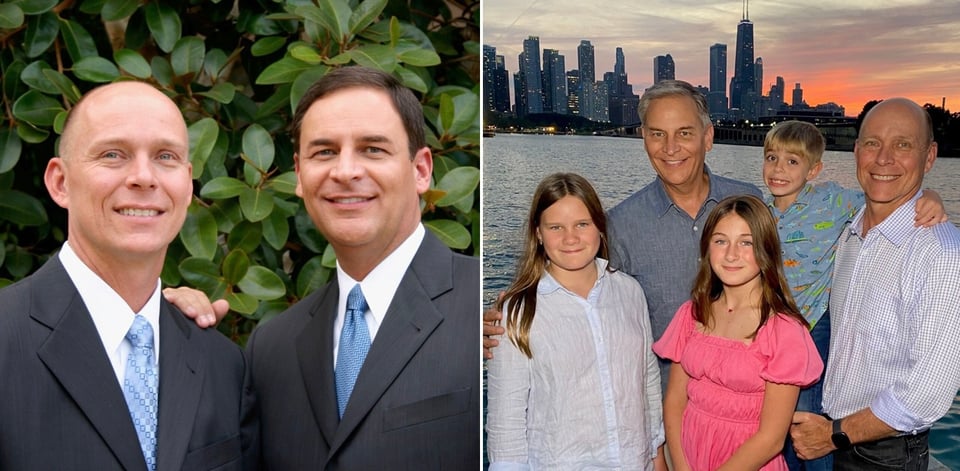
Rick Olson, far left, and Jay Timmons at their wedding in 2008 and with their family during a recent trip to Chicago.
Jay Timmons, the president and chief executive of the National Association of Manufacturers, a powerful Washington trade association, was a Republican operative in charge of the party’s Senate campaign committee when he was outed against his will by liberal activists in 2004. He and his now-husband were married when it was briefly legal in California in 2008. In 2015 they began a protracted and expensive court battle when an idiosyncratic right-wing judge in Wisconsin barred them from bringing home their third child, a son born through surrogacy.
Working his connections in Virginia politics, Timmons, 62, helped get the state legislature to pass “Jacob’s Law” to prevent others from enduring similar situations, and he was involved in the Methodist Church’s move last week to recognize same-sex marriages and allow gay clergy. “We’re the only two-dad family at the elementary school, and we have the same joys and challenges every other family has,” Timmons said. (WSJ).
_________________________________________________